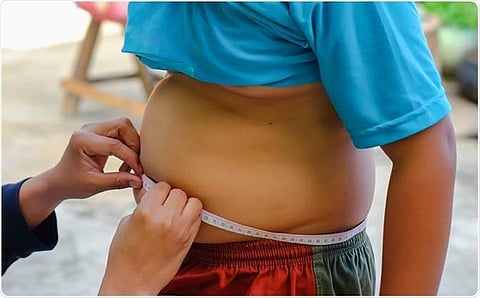

Probiotic supplements, when taken alongside a calorie-controlled diet, may help children and adolescents with obesity lose weight, according to new research.
The study, being presented at e-ECE 2020, found that obese children who were put on a calorie-restricted diet and given probiotics Bifidobacterium breve BR03 and Bifidobacterium breve B632 lost more weight and had improved insulin sensitivity compared with children on a diet only.
These findings suggest that probiotic supplements and a calorie-controlled diet may help manage obesity in the younger population and reduce future health risks, such as heart disease and diabetes.
Obesity is a global health concern and can lead to a number of life-threatening conditions, such as diabetes and heart disease. Treatment and prevention is a serious public health challenge, especially in children and adolescents.
A bifidobacteria are a group of probiotic bacteria that are part of the natural gut microbiome and help with preventing infection from other bacteria, such as E Coli, and digestion of carbohydrates and dietary fibre. During digestion, they release chemicals called short-chain fatty acids, which play an important role in gut health and controlling hunger. Low numbers of Bifidobacteria may impair digestion, affect food intake and energy expenditure, leading to body weight gain and obesity.
Previous studies suggested that probiotic supplementation with Bifidobacteria could help restore the composition of the gut microbiome, which may aid weight loss and could be a potential approach for obesity management. However, current research uses mixtures of different strains of probiotics and does not examine the effects of administering Bifidobacteria alone.
Dr Flavia Prodam and her team at the University of Piemonte Orientale aimed to assess the impact of Bifidobacteria probiotic treatment in children and adolescents with obesity on a controlled diet, on weight loss, and gut microbiota composition. 100 obese children and adolescents (6-18 years) were put on a calorie-controlled diet and randomly given either probiotics Bifidobacterium breve BR03 and Bifidobacterium breve B632, or a placebo for 8 weeks. Clinical, biochemical, and stool sample analyses were carried out to determine the effect of probiotic supplementation on weight gain, gut microbiota, and metabolism.
The results suggested that children who had taken probiotics had a reduction in waist circumference, BMI, insulin resistance, and E.coli in their gut. These beneficial effects demonstrate the potential of probiotics in helping to treat obesity in children and adolescents when undergoing dietary restrictions.
"Probiotic supplements are frequently given to people without proper evidence data. These findings start to give evidence of the efficacy and safety of two probiotic strains in treating obesity in a younger population," Dr Prodam said.
The study suggests that supplementation with probiotics could modify the gut microbiome environment and beneficially affect metabolism, helping obese children or adolescents who are also undergoing a restricted diet to lose weight. However, larger studies over a longer period of time are needed to investigate this.
Dr Prodam explained, "The next step for our research is to identify patients that could benefit from this probiotic treatment, with a view to creating a more personalised weight-loss strategy. We also want to decipher more clearly the role of diet and probiotics on microbiome composition. This could help us to understand how the microbiota is different in young people with obesity."
